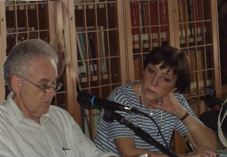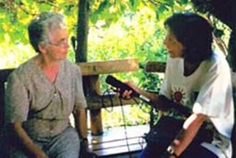|
Tullia Magrini edited Music and Anthropology from its inception in 1996 until her untimely death last year. With the publication of issue 10, Music and Anthropology reached an important milepost - its decennial. Would that she were with us to enjoy this moment. We would have been celebrating not only a remarkable collection of articles representing the very best of Mediterraneanist music scholarship, but also the vitality of a scholarly scene that revolved around the ICTM Mediterranean study group and the Levi Foundation in Venice. Tullia bought all of this together, with an inimitable blend of intellectual seriousness, irrepressible energy and a tireless imagination.
younger and older scholars, between Europeans and Americans, and between people representing very different intellectual traditions were being forged. Tullia was not only the organizer, but also the living and beating heart of the project, intellectually, socially, and emotionally.
The project had two important dimensions. One was a commitment to a broad conception of area study. This involved comparative moves across the region, but also a sustained effort to understanding histories of entanglement, contact, influence, exchange and violence, histories that simultaneously complicate and enrich the culture concept. The other was methodological: a vision of ethnomusicology that forthrightly engaged anthropological models and practices, that insisted on the priority of music as social practice rather than as text or representation, and a rooting of observation and intellectual engagement in fieldwork.
Her unquenchable affection for the music, the musicians, and the music scholars of the Mediterranean region was always plain to see.
Tullia's publications included five single-authored volumes, nine edited volumes, fifty-seven articles, six CDs and seven documentary films. She wrote prolifically on the Mediterranean musical practices and repertories with which her name is associated, those of Cantabria, Emilia, Romagna and Crete. Her published work also included forays into historical issues (Bartok, De Martino) and occasional excursions to other seas (Bali). She thought and wrote rigorously and analytically, in a style that enabled broad and provocative comparisons across time and space, retaining some of the
Her work, as writer, friend, and builder of scholarly communities, will outlive us. We can scarcely imagine where it will take future generations of Mediterraneanists. She herself will be missed terribly by all those of us involved with Music and Anthropology.
Martin Stokes Co-editor, Music and Anthropology The University of Chicago |

